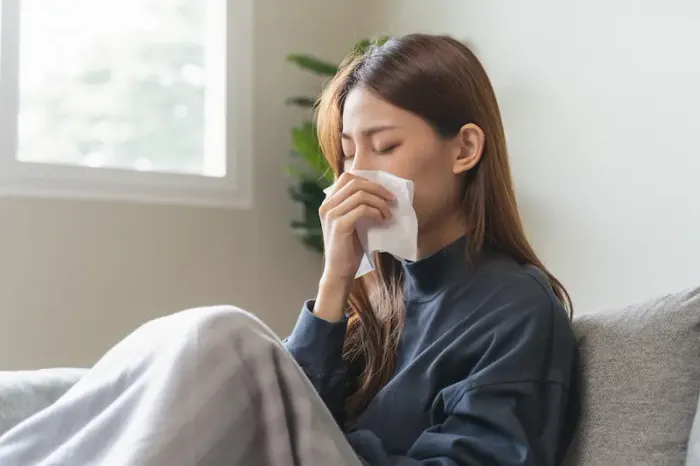Your Ultimate Guide to Managing Winter Allergies
Discover how to manage winter allergies with practical tips, home remedies, and effective treatments. Learn the difference between winter allergies and colds, their triggers, and how to find relief.


Introduction
When the temperature drops, you expect to bundle up against the cold, not a relentless barrage of sneezes, sniffles, and itchy eyes. Yet, for millions, the winter months bring a different kind of seasonal misery: winter allergies. Unlike their spring and summer counterparts, these allergies aren't triggered by pollen but by the very things we retreat to for warmth—our homes. This guide will demystify winter allergies, helping you distinguish them from a common cold, identify the hidden triggers within your home, and arm you with practical, effective strategies to fight back. We'll explore everything from simple environmental changes to over-the-counter remedies, empowering you to reclaim your comfort and breathe easily all season long.
Why Do Allergies Flare Up in Winter?
The key to understanding winter allergies lies in our behaviour. As the weather turns frigid, we spend more time indoors with windows sealed tight. This creates a perfect storm for indoor allergens to accumulate and our exposure to them to skyrocket.
The Indoor Confinement Effect
Sealed environments have minimal ventilation, allowing allergen levels to build up to concentrations far higher than what we'd experience in warmer, more aired-out months. While you're safe from pollen, you're in a constant, close-quarters battle with a host of other irritants.
Common Winter Allergy Triggers
Dust Mites: The Unseen Bedroom Invaders
These microscopic creatures thrive in warm, humid environments and feed on the dead skin cells we shed. They are a leading cause of year-round allergies, but their impact is felt most acutely in winter. Their faecal matter and body fragments become airborne during activities like making the bed or hoovering, triggering allergic reactions.
Mould and Mildew: Thriving in Dampness
Mould spores are a common allergen that can grow anywhere there is moisture. In winter, common sources include humidifiers that aren't cleaned regularly, damp basements, bathrooms without proper ventilation, and even areas around windows where condensation collects.
Pet Dander: More Time Indoors Means More Exposure
If you have furry friends, you're likely spending more time with them indoors during the winter. Pet dander (skin flakes), saliva, and urine can all trigger allergy symptoms. Even if you’re not newly allergic, prolonged exposure in an unventilated space can exacerbate sensitivities.
Winter Allergies vs. Common Cold: How to Tell the Difference
This is a critical distinction, as it determines the best course of treatment. Both can cause misery, but their origin and patterns differ.
Symptom |
Duration and Onset Clues
A cold will run its course in about a week. If your "cold" symptoms persist for weeks on end, it's almost certainly an allergy. Furthermore, if symptoms appear abruptly every time you kick up dust while cleaning or cuddle with a pet, you're likely dealing with an allergic reaction.Consult a Specialist for Personalised Advice
Proactive Strategies: Allergy-Proofing Your Home
The most effective way to combat winter allergies is to reduce your exposure to the triggers. This involves a strategic approach to cleaning and controlling your home's environment.
Winning the Battle Against Dust Mites
• Use Allergen-Proof Covers: Encase your mattress, pillows, and duvet in zippered, allergen-proof covers. This creates a barrier between you and the mites.
• Wash Bedding in Hot Water: Wash your sheets, pillowcases, and blankets weekly in hot water (at least 130°F or 54°C) to kill dust mites.
• Control Humidity: Dust mites thrive in humidity above 50%. Use a dehumidifier to keep indoor humidity levels between 30% and 50%.
Eradicating Mould Spores
• Clean Humidifiers: If you use a humidifier, clean it thoroughly every three days to prevent mould and bacteria growth. Consider using a unit with a built-in hygrometer to maintain ideal humidity.
• Ventilate Bathrooms and Kitchens: Use extractor fans during and after showers and cooking to remove moisture.
• Fix Leaks Promptly: Address any plumbing leaks or water damage immediately to prevent mould growth behind walls or under floors.
Managing Pet Allergies in Close Quarters
• Create Pet-Free Zones: Make your bedroom a strict sanctuary off-limits to pets. This gives your immune system 8 hours of relief each night.
• Groom Pets Regularly: Bathe your pets more frequently to reduce the amount of dander they shed. Have a non-allergic family member brush them outdoors.
• High-Efficiency Vacuuming: Use a vacuum cleaner equipped with a HEPA filter to effectively trap dander and other allergens from carpets and upholstery.
Effective Relief: Medical and Natural Remedies
When environmental controls aren't enough, several remedies can provide effective relief for winter allergies.
Over-the-Counter (OTC) Solutions
• Nasal Corticosteroid Sprays: (e.g., Flonase, Nasacort) These are often the first-line medical treatment for reducing inflammation and are highly effective for most people.
• Antihistamines: (e.g., Claritin, Zyrtec, Allegra) These block the histamine that causes sneezing, itching, and runny nose. Non-drowsy formulas are ideal for daytime use.
• Decongestants: (e.g., Sudafed) Can provide short-term relief for nasal stuffiness but should not be used for more than a few days.
Natural and Home Remedies for Symptom Relief
• Nasal Irrigation: Using a saline sinus rinse or neti pot can flush out mucus and allergens from your nasal passages, providing significant relief from congestion.
• HEPA Air Purifiers: Placing a high-quality HEPA air purifier in your bedroom can dramatically reduce the concentration of airborne allergens like pet dander and dust mite debris while you sleep.
• Steam Inhalation: Inhaling steam from a hot shower or a bowl of hot water can help moisten dry nasal passages and loosen congestion.
When to Seek Professional Help
If your symptoms are severe, persist despite using OTC medications and environmental controls, or are significantly impacting your sleep and daily life, it's time to consult a doctor. They can confirm your triggers through allergy testing and may prescribe stronger medications, such as prescription-strength sprays or allergy shots (immunotherapy). If symptoms persist beyond two weeks, consult a doctor online with Apollo24|7 for further evaluation and a personalised treatment plan.
Conclusion
Winter allergies, driven by indoor triggers like dust mites, mould, and pet dander, can turn your cosy haven into a source of discomfort. However, they are not an inevitability. By understanding the difference between allergies and a cold, taking proactive steps to allergy-proof your living space, and utilising effective OTC or natural remedies, you can take control. The goal is to create a clean, well-managed indoor environment where you can find true relief. Remember, you don't have to just endure months of sniffling and sneezing. Implement these strategies, and if needed, don't hesitate to seek professional guidance to enjoy a clear and comfortable winter.Consult a Specialist for Personalised Advice
Consult a Specialist for Personalised Advice

Dr. Utsa Basu
Diabetologist
14 Years • MBBS , MD
Barasat
Diab-Eat-Ease, Barasat
(75+ Patients)

Dr. Shiv Krishna Mitra
General Physician/ Internal Medicine Specialist
15 Years • MBBS GEN. MED. PGDRM, MCH
Kolkata
Samaritan Clinic, Kolkata

Dr. Imtiyaz Khan
General Practitioner
6 Years • MD (Physician), Fellowship in Critical Care,AFIH
Bengaluru
Apollo Clinic, Sarjapur Road, Bengaluru

Dr. Rupam Chowdhury
Orthopaedician
10 Years • MBBS, DNB (Ortho.)
Kolkata
MCR SUPER SPECIALITY POLY CLINIC & PATHOLOGY, Kolkata

Dr. Arif Ahmed
General Physician/ Internal Medicine Specialist
9 Years • MBBS, MD (Genl. Med.)
Kolkata
MCR SUPER SPECIALITY POLY CLINIC & PATHOLOGY, Kolkata
Consult a Specialist for Personalised Advice

Dr. Utsa Basu
Diabetologist
14 Years • MBBS , MD
Barasat
Diab-Eat-Ease, Barasat
(75+ Patients)

Dr. Shiv Krishna Mitra
General Physician/ Internal Medicine Specialist
15 Years • MBBS GEN. MED. PGDRM, MCH
Kolkata
Samaritan Clinic, Kolkata

Dr. Imtiyaz Khan
General Practitioner
6 Years • MD (Physician), Fellowship in Critical Care,AFIH
Bengaluru
Apollo Clinic, Sarjapur Road, Bengaluru

Dr. Rupam Chowdhury
Orthopaedician
10 Years • MBBS, DNB (Ortho.)
Kolkata
MCR SUPER SPECIALITY POLY CLINIC & PATHOLOGY, Kolkata

Dr. Arif Ahmed
General Physician/ Internal Medicine Specialist
9 Years • MBBS, MD (Genl. Med.)
Kolkata
MCR SUPER SPECIALITY POLY CLINIC & PATHOLOGY, Kolkata
More articles from Allergies
Frequently Asked Questions
1. Can you develop winter allergies later in life?
Yes, it is possible to develop allergies at any age. A change in environment, immune system function, or increased exposure to a new allergen (like getting a pet) can trigger the onset of adult-onset allergies.
2. Can winter allergies cause a cough?
Absolutely. Postnasal drip—where mucus drips down the back of your throat—is a common symptom of allergic rhinitis. This can cause a persistent, nagging dry cough from winter allergies, especially at night.
3. Is a humidifier or dehumidifier better for winter allergies?
It depends on the trigger. A dehumidifier is better for combating dust mites and mould, which thrive in high humidity. A humidifier can help if dry air is irritating your nasal passages and sinuses, but it must be kept impeccably clean to avoid spreading mould spores.
4. What is the best over-the-counter medicine for winter allergies?
There's no single 'best' medicine, as it depends on your primary symptoms. Nasal corticosteroid sprays (e.g., Flonase) are excellent for overall inflammation and congestion. Non-drowsy antihistamines (e.g., Claritin, Zyrtec) are better for sneezing and itching. It's best to consult a doctor on Apollo24|7 for a personalised recommendation.
5. Can winter allergies make you feel tired?
Yes. The body's inflammatory response to allergens can be exhausting. Furthermore, allergy symptoms like congestion can disrupt sleep, leading to daytime fatigue and a feeling of being unwell.
.webp)



